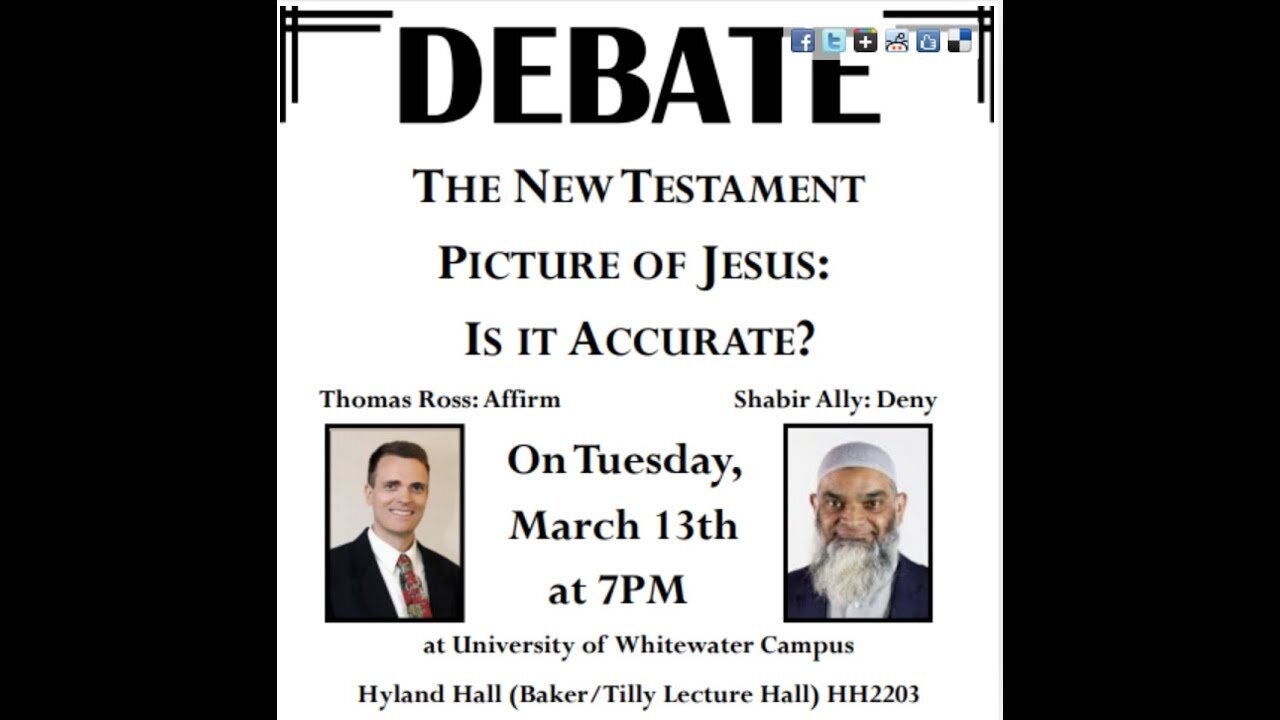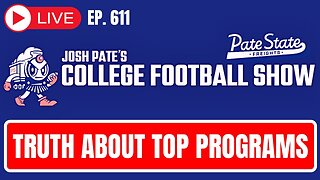Premium Only Content

Shabir Ally & Thomas Ross Debate: The New Testament Picture of Jesus: Is It Accurate?
Shabir Ally and Thomas Ross debated "The New Testament Picture of Jesus: Is it Accurate?" at the University of Wisconsin at Whitewater in 2018. The debate terms and conditions stated: "The debate concerns whether or not the facts of history demonstrate that the New Testament presents accurately or corrupts the original picture of Jesus as evidenced by the historical Jesus’ self-understanding and proclamation and as understood and proclaimed by His eyewitnesses and earliest followers. It is not over the preservation of the New Testament after the autographs, but over the extant facts of history as they relate to the accuracy of the New Testament’s preservation of Jesus."
The scholar of Islam, Shabir Ally, argued that the Gospels were not written by their traditional authors and affirmed that late dates for the Gospels are correct. He argued that the New Testament was contradictory, and that an evolutionary development took place from the original and historical Jesus, who was the Quranic / Muslim prophet, not the Son of God who died by crucifixion as a substitutionary sacrifice and rose from the dead. Over time, this Muslim Jesus evolved into the Jesus of Christianity, through stages from “Q,” to Mark, to Matthew and Luke, and finally to John. Shabir Ally did not cite ancient historical sources, but claimed that modern liberal scholarship shows that his views and arguments are valid.
The Baptist and Christian scholar, Thomas Ross, provided many historical facts in favor of the four canonical Gospels (Matthew, Mark, Luke, and John) by their traditional authors. Therefore, he argued, the New Testament picture of Jesus Christ as the Divine-human Son of God and Son of Man who was crucified, died for man's sins, and rose again from the dead finds support from early eyewitness testimony from Christ’s closest followers. Mr. Ross also gave evidence that the traditional early dates for the Gospels set forth by the ancient historical sources validate the accuracy of the New Testament’s picture of Jesus Christ. He also cited very early sources such as 1 Corinthians 15 and the “Christ hymn” or Carmen Christi of Philippians 2:5-11 as evidence for the Christian view of the Lord Jesus, which also receives support from the Apostles Peter and Paul, James, Jude, and the New Testament as a whole. Higher critical theories of the authorship and dating of the New Testament are based upon a rejection of all ancient evidence and are mere empty speculation. Thomas Ross argued there never was a “Q” source and Matthew, Mark, and Luke were independent sources based on eyewitness testimony. Markan priority and literary dependence among the synoptic Gospels, source criticism, and other similar ideas are false and have no support in the extant ancient historical evidence. The Bible, he argued, is the non-contradictory, historically accurate, and infallibly inspired Word of God. Furthermore, Mr. Ross argued that the evidence and the historical sources for the life of Christ as recorded in the Bible are vastly superior to and far earlier than the historical sources of the Quran (Koran) and the life of Muhammad, so if Muslims believe the sources for the Quran are accurate they need to recognize the accuracy of the New Testament. The overwhelming testimony of ancient history favors the historicity of the Christian view of the Lord Jesus Christ.
More information about the debate is available at:
https://faithsaves.net/Shabir-Ally-debate/
-
 9:09
9:09
rebuildingthegates
4 years agoChristian's Debate on Old Testament Law
40 -
 0:23
0:23
Newsy
3 years agoTrump Ally Thomas Barrack Pleads Not Guilty
1.58K4 -
 1:02:03
1:02:03
Shear-Jashub Christian Tabernacle
3 years ago3/21/21 Fulfilling the Law: Messiah Jesus in the Old Testament
37 -
 1:36:21
1:36:21
Sarah Westall
9 hours agoViolence Erupting in the Panama Canal, Identifying Enemy Infiltration, Psyops Ongoing w/ Michael Yon
78.4K30 -
 1:56:25
1:56:25
Nerdrotic
12 hours ago $16.45 earnedThe Red Pyramid's Hidden Secrets | Forbidden Frontier #091
60.3K13 -
 2:08:53
2:08:53
vivafrei
20 hours agoEp. 252: Liberals DISQUALIFY Candidate from Race! DOGE Wins & Loses; Rumble Sues BRAZIL! & MORE!
148K250 -
 1:15:12
1:15:12
Josh Pate's College Football Show
11 hours ago $21.27 earnedCFB’s Top 12 Programs | TV Executives & Our Sport | USC Changes Coming | Early Championship Picks
88.1K3 -
 LIVE
LIVE
Vigilant News Network
15 hours agoUK Government BUSTED in Secret Plot to Extract Your Data | Media Blackout
1,670 watching -
 1:03:32
1:03:32
Winston Marshall
3 days ago"War On Children!" The DEMISE Of The West Starts With Schools - Katharine Birbalsingh
123K67 -
 48:02
48:02
Survive History
18 hours ago $8.75 earnedCould You Survive as a Sharpshooter in the Napoleonic Wars?
72.7K3